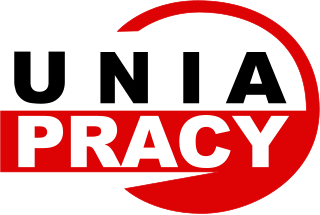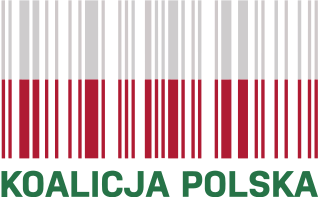 |
|---|
Related topics |
The Party of Polish Democracy (Polish : Stronnictwo Demokracji Polskiej, SDP) was a political party in Poland.
 |
|---|
The Party of Polish Democracy (Polish : Stronnictwo Demokracji Polskiej, SDP) was a political party in Poland.
The party was established in March 1991 as the Polish Christian Democratic Forum (Polskie Forum Chrześcijańsko-Demokratyczne, PFChD) as an initiative of the PAX Association and the Polish Catholic-Social Association. It contested 1991 parliamentary elections as part of the Christian Democracy alliance that won five seats. Tadeusz Lasocki was the party's sole MP.
In 1993 the party was renamed the Party of Polish Democracy. It joined the Coalition for the Republic for the parliamentary elections that year, but the alliance failed to win a seat. It was part of Solidarity Electoral Action in the 1997 elections. [1] It held one of the alliance's 201 seats in the Sejm, with Waldemar Pawłowski being its only MP.
The party was dissolved in 1999, with most members joining the Christian National Union.

Leszek Cezary Miller is a Polish politician who served as prime minister of Poland from 2001 to 2004. He has served as a Member of the European Parliament (MEP) in 2019–2024.

The Democratic Left Alliance was a social-democratic political party in Poland. It was formed on 9 July 1991 as an electoral alliance of centre-left parties, and became a single party on 15 April 1999. It was the major coalition party in Poland between 1993 and 1997, and between 2001 and 2005, with four Prime ministers coming from the party: Józef Oleksy, Włodzimierz Cimoszewicz, Leszek Miller and Marek Belka. It then faded into opposition, overshadowed by the rise of Civic Platform and Law and Justice.

Labour Union is a minor social-democratic political party in Poland. It was a member of the Party of European Socialists (PES) until April 2022.
The Democratic Party, abbreviated to PD, was a minor social-liberal political party in Poland. It had no members of the Sejm, Senate, or European Parliament.

The Hungarian Democratic Forum was a centre-right political party in Hungary. It had a Hungarian nationalist, national-conservative, Christian-democratic ideology. The party was represented continuously in the National Assembly from the restoration of democracy in 1990 until 2010. It was dissolved on 8 April 2011.
Poland has a multi-party political system. On the national level, Poland elects the head of state – the president – and a legislature. There are also various local elections, referendums and elections to the European Parliament.

Parliamentary elections were held in Poland on 27 October 1991 to elect deputies to both houses of the National Assembly. The 1991 election was notable on several counts. It was the first parliamentary election to be held since the formation of the Third Republic, the first entirely free and competitive legislative election since the fall of communism, the first completely free legislative election of any sort since 1928. Due to the collapse of the Solidarity political wing, the Solidarity Citizens' Committee, the 1991 election saw deep political fragmentation, with a multitude of new parties and alliances emerging in its wake. Low voting thresholds within individual constituencies, along with a five percent national threshold allocated to a small portion of the Sejm, additionally contributed to party fragmentation. As a result, 29 political parties gained entry into the Sejm and 22 in the Senate, with no party holding a decisive majority. Two months of intense coalition negotiations followed, with Jan Olszewski of the Centre Agreement forming a minority government along with the Christian National Union, remnants of the broader Centre Civic Alliance, and the Peasants' Agreement, with conditional support from Polish People's Party, Solidarity list and other minor parties.

The Center Civic Alliance, abbreviated as POC, was a center-right electoral alliance of several political parties that participated in the 1991 Polish parliamentary election. The Center Civic Alliance was chiefly organized by the Centre Agreement, drawing in remnants of the Solidarity Citizens' Committees, independents, and Christian right parties, including the Polish People's Christian Forum "Fatherland". The alliance was created after its main component, the Centre Agreement, attempted to form a broad alliance supporting President Lech Wałęsa. However, the alliance quickly fell out of favor with the president, failing to gain Wałęsa's approval. In its aftermath, Centre Agreement leader Jarosław Kaczyński was subsequently fired from his position as Chief of the Presidential Chancellery.

Left and Democrats was a centre-left electoral alliance of political parties in Poland which was created on 3 September 2006, before the Warsaw municipal election of 2006. The coalition's aim was to provide an alternative for both Law and Justice and Civic Platform, which have been Poland's two major political parties since 2005. LiD contested their first national election in October 2007 and won 53 seats to the Polish parliament, the Sejm. The LiD alliance was dissolved in April 2008, following a rift between the member parties.

National Party of Retirees and Pensioners is a minor left-wing political party in Poland. The main goal of KPEiR is protecting retired seniors, pensioners and trust-busting. The current leader is former Sejm Member Tomasz Mamiński.
The Christian National Union was a Christian-democratic and nationalist political party in Poland. Established on 15 September 1989, the party traced its tradition to the Solidarity movement, as well as pre-World War II National Democracy and Polish Christian Democratic Party. The party adhered to the Christian right, advocating social conservatism. From its foundation until 1994, the party was led by Wiesław Chrzanowski, who was Marshal of the Sejm in 1991–1993.

The National Workers' Party was a political party in Poland.

Christian Democracy was a political alliance in Poland.

The Labour Party is a minor political party in Poland. It was formally called the Christian-Democratic Labour Party(Polish: Chrześcijańsko-Demokratyczne Stronnictwo Pracy, ChDSP) between 1989 and 2000. The party continued the traditions of the pre-war Labor Party, which ceased its activities in Poland in 1946. This made the party be considered a historical formation, together with the Polish Socialist Party.
The Federacja Polskiej Przedsiębiorczości was a political party in Poland.

Parliamentary elections were held in Poland on 13 October 2019. All 460 members of the Sejm and 100 senators of the Senate were elected. The ruling right-wing Law and Justice (PiS) won re-election to a second term retaining its majority in the Sejm. However, it lost its majority in the Senate to the opposition. With 43.6% of the popular vote, Law and Justice received the highest vote share by any party since Poland returned to democracy in 1989. The turnout was the highest for a parliamentary election since the first free elections after the fall of communism in 1989. For the first time after 1989, the ruling party controlled one house, while the opposition controlled the other.

The Union of European Democrats is a liberal political party in Poland. It is led by Elżbieta Bińczycka.
The Civic Coalition is a catch-all political alliance currently ruling in Poland. The alliance was formed around Civic Platform in opposition to the then-ruling Law and Justice (PiS) party.

The Polish Coalition is a political alliance in Poland. It is led by the Polish People's Party.
The Forum of the Democratic Right was a conservative political party in Poland from 1990 to 1991.